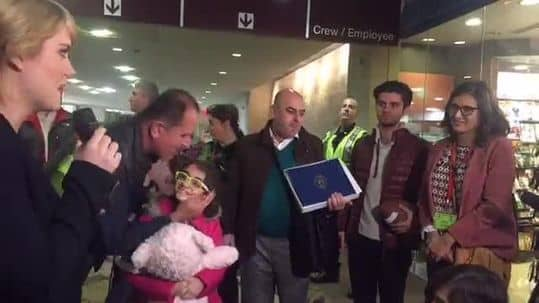2017-02-06 17:23:00
Actress Connie Britton, left, and Nashville Mayor Megan Barry greet Fuad Sharef Suleman after Suleman and his family arrived Sunday, Feb. 5, 2017, at Nashville International Airport.(Photo: George Walker IV, The Tennessean)
NASHVILLE — A Kurdish family stopped on their way to Nashville and sent back to Iraq after President Trump signed a travel ban Jan. 27 arrived in Nashville on Sunday night with a large group present to welcome them.
After at least 18 hours in the air, the family walked out of the gate at Nashville International Airport to hundreds of people bearing signs, flowers and gifts.
They chanted, "Welcome home" as the family grinned and waved their way past the welcoming party.
Fuad Sharef Suleman, his wife, Arazoo Ibrahim, and their three children were prevented from boarding a connecting flight at Cairo International Airport to Nashville on Jan. 28 despite having special immigrant visas from Suleman's work with the U.S. government.
The crowd apologized in unison to the family for what they'd been through.
"It's OK," Suleman said, waving again. "Today is a very important day in my and my family's life. It marks my first day of my new life in Nashville, Tennessee, United States of America. But your presence here and the amount of support that you have shown and your open arms make this day a very, very exceptional day for me."
He thanked his "fellow Nashvillians."
Trump signed the executive order Jan. 27 barring nationals from seven predominantly Muslim countries from entering the United States, including Iraq. One week later, the ban was reversed by a federal judge in Seattle. The Trump administration is asking a federal appeals court to overturn the judge’s injunction halting his travel ban, after criticizing the ruling as “ridiculous” and a “terrible decision.”
The president has argued the ban on legal travel from certain countries, along with a suspension of the U.S. Refugee Resettlement Program, is necessary to strengthen borders and implement "extreme vetting" to keep the nation safe.
The current vetting process can take anywhere from two to three years. Opponents point out that no one from any of the banned countries has carried out an attack on U.S. soil.
U.S. Rep. Jim Cooper, a Democrat from Tennessee, fought for the family and ensured they were cleared for travel.
The Tennessee Immigrant and Refugee Rights Coalition organized the welcoming rally at the airport to show the family what "Southern hospitality" looks like, the organization said. More than 200 people showed up.
"Bi xêr hatî," Nashville Mayor Megan Barry said, using the Kurdish words for welcome. "We are so blessed that you chose Nashville to come and spend the rest of your lives."
She said she hoped to be there at the family's swearing in ceremony when they become U.S. citizens.
Suleman used to work as a regional translator for RTI International, a research organization with a contract through the U.S. government. Because those who work with the American government in Iraq are in danger from groups such as the Islamic State, Suleman said he and his family were given special immigrant visas to come to the United States.
The family had sold their home and vehicles, quit their jobs and pulled their children out of school in preparation for their move to Nashville. Before they were cleared again for travel, they were staying with a family member.
Erbil, where the family is from, is in Kurdistan, a semi-autonomous region in Northern Iraq. Kurdistan is home to the Kurdish Peshmerga, who are one of the U.S. military's most reliable allies in the fight against the Islamic State.
Nashville has the largest population of ethnic Kurds in the United States, with estimates ranging from 12,000 to 17,000 residents, experts say. The number is difficult to pinpoint because it's not measured by the U.S. Census. Many of the American Kurds came as refugees during the early 1990s after Saddam Hussein attacked them using chemical weapons.
It is the Kurdish community that first drew Suleman and his family to Nashville, where they already have friends.
Nawzad Hawrami, director of Kurdish mosque the Salahadeen Center, welcomed the family to Nashville's "small Kurdistan."
"Welcome to America," said Hawrami. "Welcome to the land of justice, land of freedom, land of human rights, land of charity, land of generosity."


